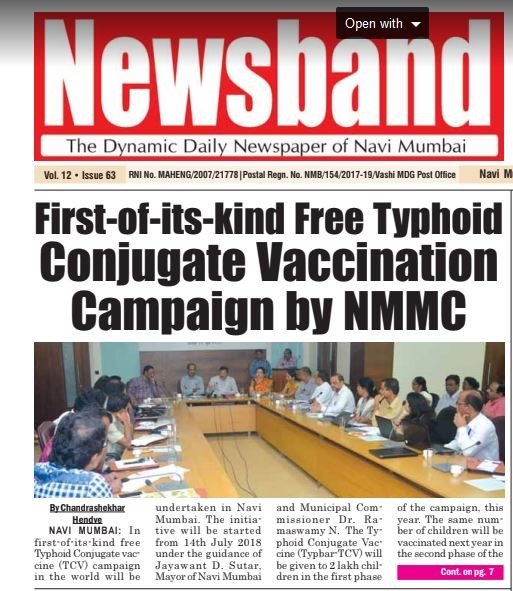TCV Navi Mumbai

TCV Navi Mumbai
Objectives
To evaluate impact of typhoid conjugate vaccine (TCV) introduction on typhoid fever burden among children under 15 years old in Navi Mumbai, India, including on:
1. Blood culture-confirmed typhoid fever
2. Clinical syndromes of severe febrile illness
3. Environmental water contamination with Salmonella Typhi and S. Paratyphi A
Rationale
Why we care about this
Typhoid fever is a serious systemic infection caused by Salmonella Typhi, and south Asia has the highest estimated incidence globally with a significant burden of disease among children. Rising antimicrobial resistance compounds public health problems of typhoid control: an ongoing outbreak of extensively drug-resistant (resistant to 5 classes of antibiotics) typhoid in Pakistan has surpassed 10,300 cases with limited treatment options. Prevention of typhoid relies on safe, adequate water supply and strategic use of vaccinations. A new generation of typhoid conjugate vaccines (TCVs) have been shown to be safe and provide long-lasting immunity in children. Typbar TCV is manufactured by Bharat Biotech International Limited and has received World Health Organization (WHO) prequalification status for programmatic use to prevent typhoid fever. However, there are no field effectiveness studies yet for Typbar TCV.
Navi Mumbai is a metropolitan area in India with approximately 1.4 million people and high enteric fever burden. Navi Mumbai Municipal Corporation (NMMC) is leading the world’s first public sector typhoid conjugate vaccine (TCV) introduction program and is providing free TCV to all children 9 months to 15 years old living in NMMC areas, approximately 250,000 children in total. A two-phase cluster-randomized program is being used to allow rigorous evaluation of population impact, with half of NMMC’s urban health posts vaccinating children in 2018 and the remaining half in 2019/2020. Program evaluations include: vaccine safety, impact on burden of typhoid disease using a low-cost hybrid hospital-based and community-based surveillance system, vaccine effectiveness, cost-effectiveness, and environmental surveillance.
Why we see the knowledge we are generating as strategic
NMMC’s TCV introduction is a unique opportunity to evaluate TCV impact at a population level scale. We are using a hybrid facility- and community-based typhoid surveillance strategy to evaluate the impact of NMMC’s TCV introduction program on typhoid disease burden in Navi Mumbai, India. This research will provide data critical for local, national, and global public health practitioners to develop and decide on typhoid vaccine policies.
Project Dates
2017 - 2020
Stage of Work
Stage on Stairway of Research - Stage 6: Scale Up the intervention
What has been accomplished so far within the project
NMMC vaccinated over 113,000 children age 9 months to 15 years old with TCV in July-August 2018. Initial evaluations show approximately 70% vaccination coverage achieved by the first phase of the program and a good safety profile.
What are we focusing on now
The second phase of the vaccination introduction is in planning phase. Hospital, community, and environmental surveillance for typhoid is ongoing.
People
Primary Contact: Christopher LeBoa
Stanford University
. Stephen Luby, Professor, Co-PI (Coalition Against Typhoid)
. Jason Andrews, Assistant Professor, Co-I
. Laura Kwong, Postdoc Scholar
Centers for Disease Control and Prevention (CDC)
. Kashmira Date, Co-PI
World Health Organization (WHO), India
. Pankaj Bhatnagar, Co-PI
National Institute of Cholera and Enteric Diseases (NICED)
. Shanta Dutta, PI
Grant Government Medical College, Mumbai (GGMC)
. Nilma Hirani, Co-I
Funding